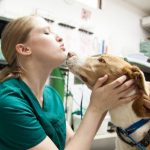
Some older dogs can become irritable, bad-tempered or combative. They might not want to be petted, get aggravated with other pets, or refuse to tolerate puppies or other dogs. Maybe this shouldn’t be so surprising because we all know at least one elderly person who is a complete grouch!
This old dog behavior has different levels of intensity, ranging from mild irritability to all-out aggression. If your senior dog is suddenly becoming more irritable, don’t ignore it because it “might just be old age”. Your dog is likely to be suffering from a physical or mental condition.
In this article, we will review common reasons that cause senior dogs to become grumpy or cranky, and understand what you can do about it.
What Causes Senior Dogs to Suddenly Become Grumpy or Cranky?
It’s important to understand the underlying reason causing this change in behavior with your old friend. A senior dog becoming grumpy or bad-tempered is usually caused by one of the following 4 reasons:
1. Pain or discomfort
Did you know that as many as 60-80% of dogs may experience arthritis issues at some point in their lives? Old dog pain and discomfort is a very common issue. A dog who is in pain can show a wide variety of symptoms. Some are obvious, some are very easy to miss, or misunderstand. But, our dogs can’t verbalize their discomfort and/or distress so it’s up to us to learn how to recognize when our best friend is in pain, and to learn how to help him feel better.

Due to aging bodies, degenerative conditions or chronic health problems (sometimes requiring surgery) older dogs tend to experience pain more often than younger ones. They can also be injured more easily than a younger, stronger dog.
The type of treatment you need for a dog who is in pain obviously depends on what is causing it: chronic conditions such as arthritis or hip dysplasia can be treated with certain medications and sometimes with physical therapy too. Dental problems and disease may need tooth extractions and cleaning under anesthetic, etc.
This page about pain in senior dogs will help you recognize the signs of a dog who is in pain, as well as give advice on finding the help that he needs to feel better.
2. Fear or anxiety
Is your dog showing symptoms such as excessive panting, sleeping problems, shaking, restlessness or less of appetite? Your dog could be suffering from anxiety. Even if your dog has always been a confident, happy dog, it won’t be unusual for him to begin to show anxious behavior when he reaches his senior years.

The way you handle your dog’s anxiety depends on the reasons for his fears and, to some extent, his own individual personality. Treatment options include behavioral and lifestyle modifications, natural treatments and products, and some medications.
Anxiety can also be just one symptom of a systemic or more wide-spread health problem such as canine cognitive dysfunction (aka “Old Dog Syndrome”), which is similar to human Alzheimer’s. Learn more more about anxiety in senior dogs.
3. Canine Cognitive Dysfunction (Doggie Dementia)
‘Old Dog Syndrome’ in dogs is similar to Alzheimer’s disease in humans. Studies showing that around 50% of dogs who are eight years or older show some signs of this condition. By age eleven it’s over 60%. The information on this page will help you figure out whether or not your senior is showing signs of CCD (or Old Dog Syndrome).

Common changes that could indicate your dog is suffering from CCD includes : changes in sleeping habits, loss of bladder or bowel control, excessive shaking or panting, loss of appetite, getting lost easily (even in family rooms), restless roaming, decreased affection, or other new or uncharacteristic behavior. Learn more about CCD / Old Dog Syndrome.
4. Loss of senses such as sight or hearing.
Older dogs develop vision problems but don’t have access to eyeglasses. you may notice things like your dog hesitating to go from a dark room to a light one or vice versa. He may be hesitant to go outside at night due to poor vision. Just like us, you may notice he misses a step or trips over a doorstep. Sometimes the first tip off is your dog losing track of a ball you throw. If you notice vision problems, you can help by not rearranging the furniture, putting gates at stairways, and sometimes simply by providing more lighting for dark areas – including the yard.

Hearing loss is also common. If you find your dog not responding at all when you call his name – no flick of the ear, no turn of the head – he may be losing his hearing. One of the first signs could be your dog startling when you come into a room or when you go to pet him.
Final Words
If your naturally happy-go-lucky dog has morphed into Oscar the Grouch, then it’s important to get to the root of the problem. A veterinary visit is highly recommended as a first step. It will help identify any underlying medical issue that may be causing your senior’s dog grumpiness or bad temper.
Disclaimer: This website's content is not a substitute for veterinary care. Always consult with your veterinarian for healthcare decisions. Read More.


Wonderful article